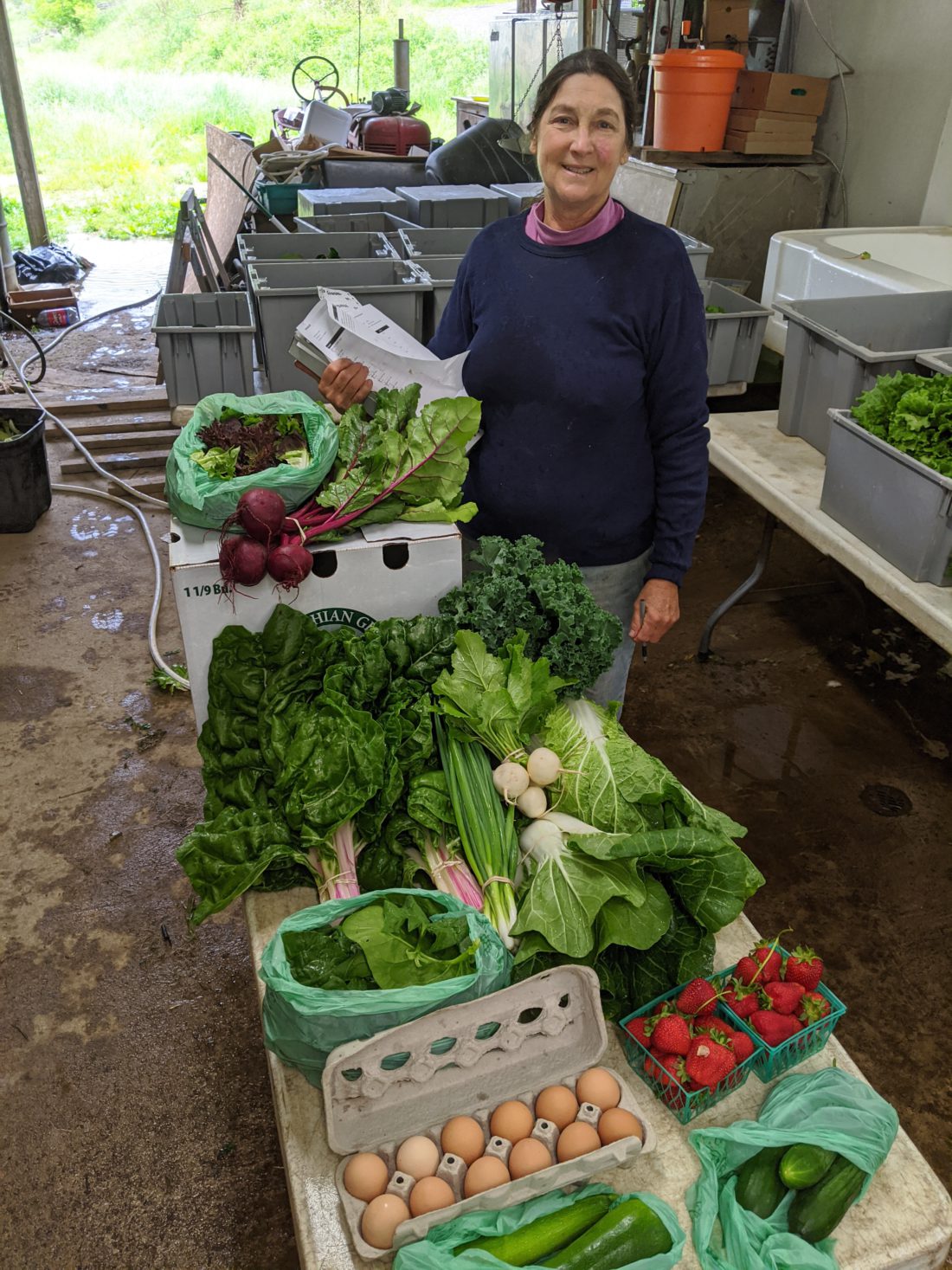Farmers are accustomed to rolling the dice. Success in the fields is inherently dependent on weather, pests and other fickle variables. But COVID-19 introduced previously unimaginable challenges to the local industry this spring, just as the growing season was getting started.
When North Carolina shut down restaurants, schools and many retail shops in March, the more than 600 Western North Carolina farms that supply those outlets suddenly found themselves without buyers for perishable harvests. As reported in The New York Times, The Guardian and other publications, similar situations have forced farmers from Florida to California to dump their crops, till millions of ripe tomatoes back into the ground and wash tankers of high-quality milk down the drain.
While WNC’s small farms have also been rocked by the coronavirus, community support and innovative thinking have enabled many local growers to pivot and persist as they work to find a way forward. “I think that this whole situation is an opportunity for people to recognize that the systems that have been in place and appearing to work and function don’t necessarily do that,” says Kendra Topalian-Sinicrope, wholesale manager and agritourism director for Mills River Creamery and Dairy. “A great silver lining in all of this is that people that haven’t necessarily purchased our product in the past are seeking it out and hearing about us and buying our stuff.”
Cold snap
In a late-March survey, the Appalachian Sustainable Agriculture Project found that 80% of its network of 935 farmers and vendors had seen immediate declines in customers and sales due to COVID-19. And two-thirds of respondents feared the financial distress of a prolonged market disruption would result in them closing their businesses, declaring bankruptcy and quitting farming.
“Being that it is early in the season, we have yet to see the impact this crisis will have on produce farms in the region, especially those that were targeting wholesale food service and restaurants,” says ASAP program director Molly Nicholie.
Almost 20% of surveyed farmers reported a need to restructure their business plans by transitioning to new market outlets or changing production. “Some farms have seen success shifting to online sales or [community supported agriculture] models, but the impacts of this crisis will not be fully realized until we are in the heat of the growing season,” says Nicholie.
Barely afloat
When dining rooms closed in March, Evan Chender, owner of The Culinary Gardener, was able to keep his business going by swiftly transitioning away from his established model of selling high-end vegetables and edible flowers exclusively to chefs. ”We grow year-round and have a lot of hoop houses and tunnels and stuff, so we had quite a bit of production and nowhere to sell it,” he says. “And at the time, all the farmers markets were closed, too. So the only logical path forward was to try to figure out how to sell directly to the public.”
By launching a CSA program the same week his restaurant market dried up, Chender was able to avoid wasting his crops and has managed to keep the business afloat. But he says the new model is not economically sustainable.
“From the outside, it looks pretty good — we’re doing between 140 and 150 shares a week. But it’s not working out particularly well from a business point of view,” Chender explains. “In the next couple of weeks, my revenues will be decreased by probably 45% or 50% a week.”
Chender received a federal Small Business Administration Paycheck Protection Program loan to help cover his three employees’ wages for a few weeks. And support from ASAP and other local farm-focused organizations in navigating the application processes for loans and grants has also been a boon. But with all his energy and time focused on keeping the CSA going, he has no answers about how his farm will be able to operate beyond the near future.
“We’re just kind of in the busiest time of year right now, on top of everything else, so I honestly haven’t really been able to give any thought to anything beyond what we’re doing tomorrow or what we’re doing this afternoon,” he says.
Silver lining

Mills River Creamery and Dairy also found itself blindsided and burdened with a surplus of milk when the restaurants and coffee shops that normally make up about 60% of its business suddenly closed. “We can’t shut down,” says the dairy’s Topalian-Sinicrope. “The animals still need to be milked. You can’t just turn off the lights, close the doors and walk away.”
Because Mills River Creamery processes its own milk, it was able to avoid sending its product swirling down the drain, as was the fate of many large commodity dairies under the same circumstances. But the cost of handling and bottling milk that had no buyer was prohibitive, so Mills River neighbor Living Web Farms jumped in to fund that part of the process, allowing the dairy to donate 500 gallons of unsold milk to a local food pantry.
From there, the dairy developed sales through community partnerships, including its existing relationship with local grocery delivery service Mother Earth Food, which has seen its business more than quadruple since mid-March. Mills River is also collaborating with the TRACTOR Food and Farms food hub in Yancey County and was one of 30 area stakeholders that helped launch the new Buncombe County cooperative online food hub, Patchwork Alliance.
As a result of this strategy, says Topalian-Sinicrope, Mills River Creamery is holding its own, especially as WNC consumers rally to support local farms and businesses. “I wouldn’t say that we are where we were prior to COVID-19, but we’re existing,” she says. “I had some fears, but they’ve been eliminated. Our retail outlets have just really, really grown.”
Heart and soul
One part of Mills River Creamery’s business that hasn’t held on through the pandemic, however, is agritourism. “I had tours booked from the end of March through the summer almost every day of the week, which is a huge piece of income that we’ve lost,” says Topalian-Sinicrope.
Julie Mansfield and Carl Evans, owners of Mountain Harvest Organics in Hot Springs, have also keenly felt the loss of tourism. The pair, who are 60 years old, shifted their business model a couple of years ago to focus heavily on farm stays and tailgate market sales after 20 years of diversified growing for a CSA. “Vegetable farming is very physically challenging, so we can’t do as much production as we did in our heyday,” says Mansfield.
But when COVID-19 shut down travel and kept tailgate markets from opening on schedule at the end of a cash-poor winter, the couple had to switch approaches yet again. They moved their annual spring plant sales online and reignited their CSA program.
“It’s a lot harder to farm a CSA because you have to have so much [crop] diversity. We don’t have as much diversity right now because our production was geared toward market sales, but people are still buying from us every week,” says Mansfield. “We still had a huge loss of income, but we’re still paying our bills through farming.”
Mountain Harvest Organics received $500 to buy packaging for its CSA through an ASAP Appalachian Grown Immediate Needs Grant, a program created to help farmers adapt to market changes due to COVID-19. The operation also qualified for a $5,000 Small Business Administration loan. But Mansfield is not sure she and Evans will be able to keep farming.
“We’ve shed a lot of tears because our heart and soul are in the soil here in this farm,” she says. “We think financially we should sell, but we might try to hang on. I don’t know. I mean, we opened our accommodations up this week, but who’s going to travel right now? How is that going to recover?”
Switching gears
Local distributors are another key piece of WNC’s food system forced to devise creative strategies to survive the crisis. Ron Ainspan, a former farmer and founder of wholesale delivery business Mountain Food Products, has been connecting local growers with restaurants and other markets since 1984. Although Mountain Food Products initially lost about 80% of its business with the stay-at-home mandate, Ainspan was able to keep operating by changing his focus. “The thought was that we were going to have to close,” he says. “But then we just started trying things.”
When he saw demand from individuals interested in home delivery, Ainspan started working with people to create small buying clubs — groups who preorder items in bulk then divvy up the purchases. Like Mills River Creamery, he started partnering with Mother Earth Food for home delivery; he also more than doubled the size of Mountain Food Products’ existing multifarm CSA program.
“Between those two pop-up programs of home delivery and Mother Earth, which was already a business, and our own CSA, there started to be some bubbling up of demand,” Ainspan says. “It felt like we were really helping out the community, and it was working and really generating some revenue where food service was not.”
He notes that traffic at the WNC Farmers Market and small produce stands has been robust as people gravitate to outdoor shopping, so there may be opportunities for farmers who shift to target those markets. “I’ve been really impressed with how innovative people have been over the last couple of months to try things in different ways,” Ainspan says. “To a large degree, rather than getting despondent, they have started thinking about, ‘Hey, what am I going to do, and how am I going to do it?’”
Mansfield points out that WNC’s many small-scale, family-owned operations have the advantage of being nimble. “We can just change our process. We didn’t have to dump our crops when the markets were canceled because CSA members came through and bought them,” she says. “Small farms that are highly diversified can switch gears real fast.”
She also credits Mother Earth Food and the Patchwork Alliance for providing new markets for farms, as well as fresh, local options for consumers. “We are lucky to have such a great region that’s so supportive of local food,” Mansfield says.
Topalian-Sinicrope agrees. “I’ve been really impressed with the partnerships that have developed over this past month and a half,” she says. “We live in a really resilient community. I’m proud to say that, and I’m proud to give [local businesses] my support and my money.”



Before you comment
The comments section is here to provide a platform for civil dialogue on the issues we face together as a local community. Xpress is committed to offering this platform for all voices, but when the tone of the discussion gets nasty or strays off topic, we believe many people choose not to participate. Xpress editors are determined to moderate comments to ensure a constructive interchange is maintained. All comments judged not to be in keeping with the spirit of civil discourse will be removed and repeat violators will be banned. See here for our terms of service. Thank you for being part of this effort to promote respectful discussion.